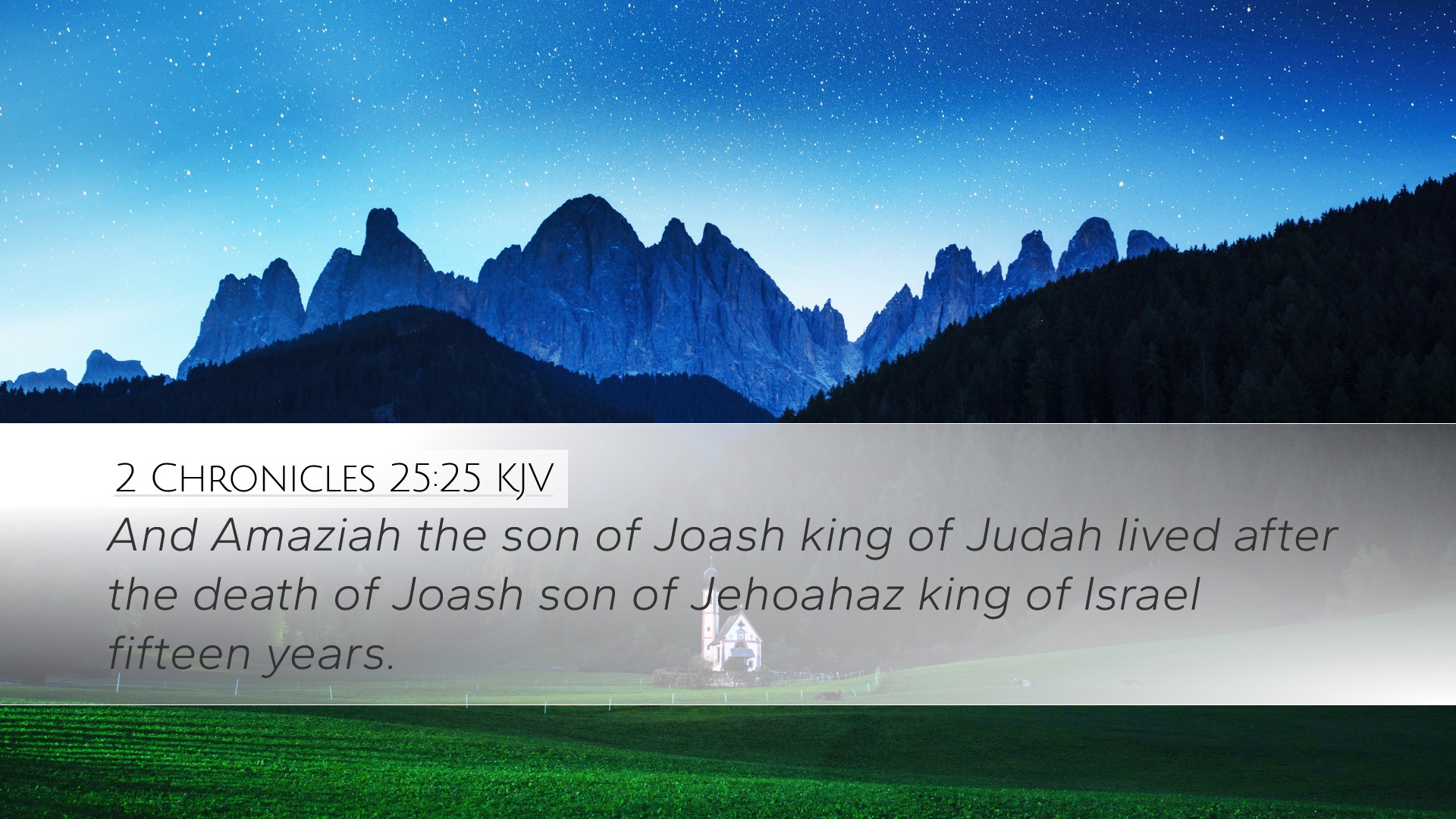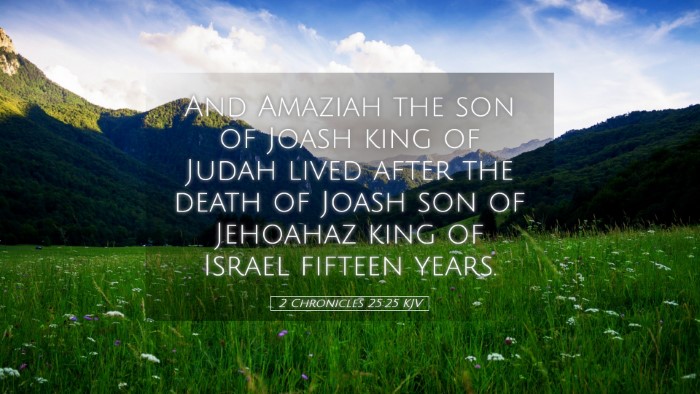Commentary on 2 Chronicles 25:25
Verse Reference: 2 Chronicles 25:25 - "And Amaziah the son of Joash king of Judah lived after the death of Jehoash son of Jehoahaz king of Israel fifteen years."
Introduction
The account in 2 Chronicles 25 offers us a window into the reign of Amaziah, the king of Judah, and highlights significant themes of leadership, divine judgment, and national identity. This verse emphasizes both the temporal nature of life and the lasting impact of one's choices.
Contextual Background
This passage occurs within the larger narrative of the Kings of Judah and Israel, depicting the political and spiritual climate of the time. Amaziah succeeded his father Joash, who had a mixed legacy, marked by restoration efforts but also a departure from true worship. Understanding this backdrop helps illuminate the implications of Amaziah’s reign and his actions detailed in the surrounding verses.
Amaziah's Legacy
Amaziah is depicted as a ruler attempting to do what is right in the eyes of the Lord, though not with a loyal heart (2 Chronicles 25:2). His complex character serves as a case study for the challenges faced by leaders who struggle to fully commit to God while navigating the temptations and pressures of power.
Insights from Matthew Henry
Matthew Henry emphasizes the importance of Amaziah's age and the time he remained in power after Jehoash. He notes that Amaziah’s reign, extended by 15 years post his royal counterpart's death, signifies both a period of opportunity for spiritual renewal and the risk of further lapsing into corruption. According to Henry, the fact that Amaziah did not learn from the fate of Jehoash serves as a cautionary tale about the perils of pride and unheeded warnings.
Insights from Albert Barnes
Albert Barnes reflects on the political environment during Amaziah’s reign, where conflicts with Israel served to highlight the plight of Judah. He suggests that the mention of the fifteen years signifies both an interval for recovery and a warning of potential national judgment if the king does not return to faithfulness. Barnes also explores the significance of historical context, urging readers to understand how Judah's spiritual condition affected its political stability.
Insights from Adam Clarke
Adam Clarke details the socio-political dynamics of Amaziah's rule, elucidating the significance of Israel's kingship and its influence over Judah. Clarke posits that the years following Jehoash’s death could indicate a chance for Judah to solidify its identity apart from Israel, provided Amaziah heeded the divine perspective over state matters. He highlights that the period was marked by divine patience, where God allowed Amaziah respite for genuine repentance.
Theological Implications
This verse serves as a pivotal reminder that leadership has profound consequences and that the paths chosen by leaders impact the broader community. Notably, the “fifteen years” can symbolize a grace period during which a leader can amend previous failings. Despite the king's initial successes, failing to remain faithful to God ultimately leads to his downfall, echoing themes from earlier biblical accounts.
Application for Today's Leaders
- Heedlessness of Warning: Like Amaziah, modern leaders must recognize the lessons of history. Ignoring past failures can lead to repeating cycles of sin and judgment.
- Opportunity for Repentance: The opportunity offered during those fifteen years signifies that every leader has a chance for redemption; genuine repentance and commitment to God's ways are essential.
- Influence of Choices: The actions taken during one’s reign affect not only the current generation but can leave a legacy impacting future descendants of faith.
Conclusion
2 Chronicles 25:25 encapsulates critical lessons for pastors, students, theologians, and Bible scholars. It serves as a reminder that our time, just like Amaziah's, can be both an opportunity for growth and a time of testing. The word of caution is timeless: to remain steadfast in faith and to lead with integrity, seeking the counsel of God as we navigate the complexities of life and leadership.


